- Home
- Addiction Treatment
- Dual Diagnosis
- Bipolar Disorder and Addiction
Bipolar Disorder and Addiction
Mental health issues are common enough in the modern world, something that many of us struggle with on a daily basis.
With the widespread availability of addictive substances -both legal and illegal– the risk of mental health issues being exacerbated by addiction is all the higher.
One of the illnesses that can be exceptionally dangerous when combined with addiction is Bipolar Disorder.
What Is Bipolar Disorder?

Bipolar disorder, also known as ‘manic depression’, is a challenging disorder that is faced by many across the UK.
Those who suffer it experience episodes of depression and mania.
Bipolar disorder affects more than 1 in 100 people, occurring at any age, but most likely becomes apparent between the ages of 15 and 19.
The symptoms of bipolar disorder depend on which mood swing you are experiencing, as people tend to swing from one extreme to the other.
You will most likely be diagnosed with depression before you have a manic episode, but this can come years later so it is difficult to diagnose straight away.
Clinical Depression And Manic Episodes
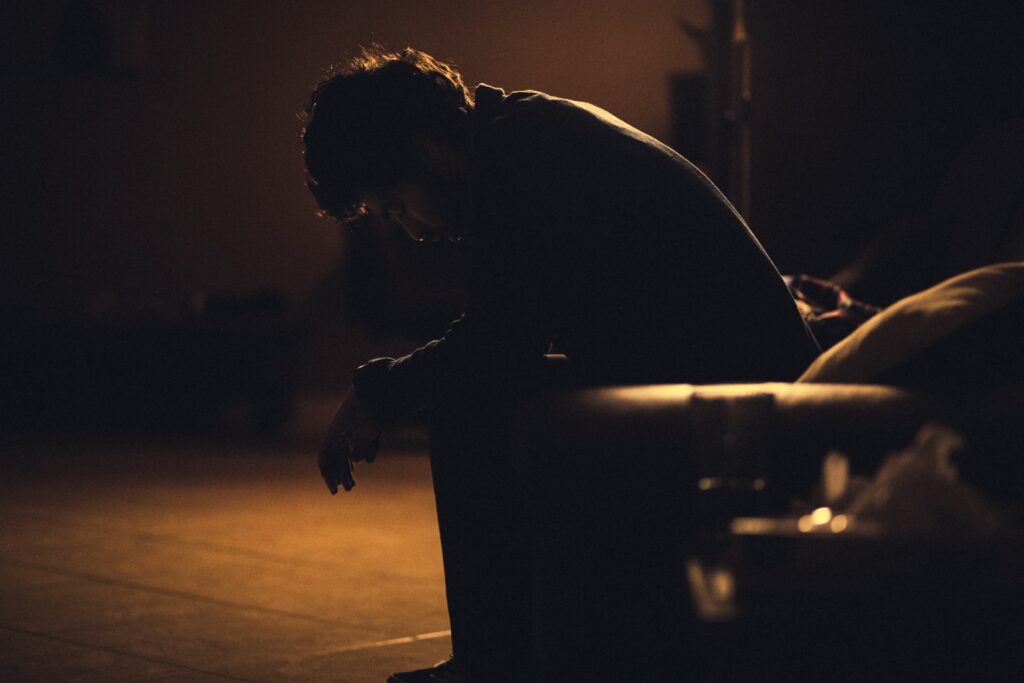
During your clinical depression, you may feel extremely low and occasionally contemplate suicide or self-harm.
During a manic episode, you are likely to feel extremely happy and have overwhelming energy to be ambitious with your ideas and plans.
This can sometimes look like spending large amounts of money on things you do not need.
This can be accompanied with a lack of sleeping or eating, talking really quickly or becoming aggravated easily.
The patterns of depression and mania look like this:
- The patterns are often different, but you may experience more of one (depression or mania) than the other.
- Between episodes, you may feel in a standard or normal mood.
- You can swing from one disorder to the other without a normal period between.
- You may experience a mixed state, where you experience hyperactivity but with a depressive mood.
- You may be diagnosed with cyclothymia, similar to bipolar disorder. This often goes undiagnosed as the mood problems are ‘not severe enough’ to warrant medical attention.
During manic episodes, if these last for over a week you may be hospitalised.
Hypomanic episodes are shorter, lasting around 4 days with less of a dramatic ‘swing’.
There are 2 categories of bipolar disorder:
- Bipolar 1: More manic or mixed episodes followed by depressive episodes
- Bipolar 2: More depressive episodes which are followed by hypomanic episodes.
Bipolar 1 is classed as more severe than bipolar 2.
The Link Between Bipolar Disorder And Substance Abuse

Approximately 60% of people diagnosed with bipolar disorder have a history of Substance Abuse Disorders or SUDs.
The link is not totally understood but it has been proven that drugs and alcohol worsen the symptoms of bipolar disorder.
Bipolar may also have developed as a side effect of drug use.
Drug use affects the brain and signalling pathways, the most common change being the brain’s reward pathways, which is why users feel a sense of euphoria.
This can lead to withdrawals, dependency and constant drug-seeking behaviour.
This affects both mood and behaviour, critical aspects of bipolar disorder.
The primary link between bipolar disorder and substance abuse is said to be patients trying to reduce the symptoms of their diagnosis.
However, it has in fact been stated that drugs often are more of a trigger for mental health issues.
Younger men, rather than women, are likely to use drugs and act in a more self-destructive way when it comes to substances and mental health.
There are four known associations between substance abuse and bipolar disorder:
1. Substance abuse is a symptom of bipolar disorder
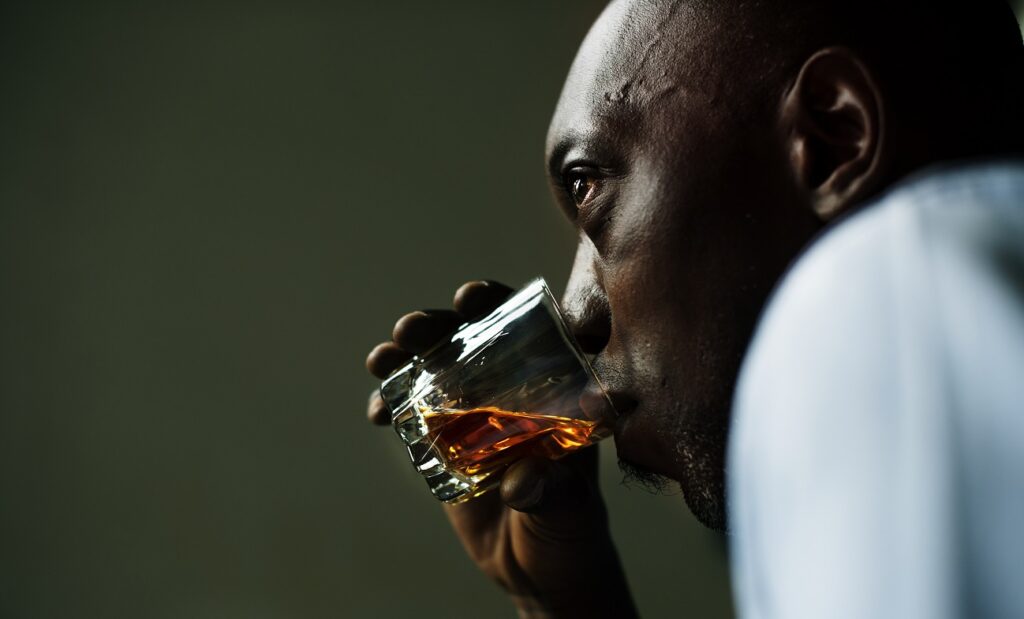
This is suggested because manic patients will do anything in excess, including the use of drugs and alcohol, also viewed as a side-effect or response to depression.
This leads us to two predictions:
A) Substance abuse depends on how the use of alcohol or drugs changes depending on whether the patient is manic or depressed
B) Substance abuse occurs after the first onset of bipolar disorder
Studies show that 32% of those with bipolar increase their use of alcohol when they are manic, and only 10% increased their drink intake when they felt depressed.
2. Substance abuse is an attempt of those with bipolar disorder to self-medicate their symptoms
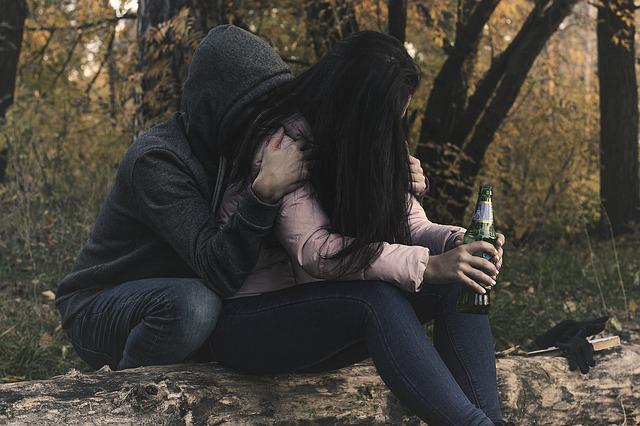
Ameliorating symptoms is a common hypothesis in this field of study.
It is evident that many try to relieve discomfort by using available substances to them, such as cannabis.
This is worsened when the patients moves into a manic state, where they turn to alcohol for its sedative effects.
In turn, patients may use cocaine or other drugs when they feel low under the pretence it will give them energy and make them happy.
From this, 2 hypotheses are gathered:
- Substance abuse begins after the bipolar disorder is diagnosed or experienced
- The type of substance depends on the state the person is in, manic or depressed
3. Substance abuse causes bipolar disorder
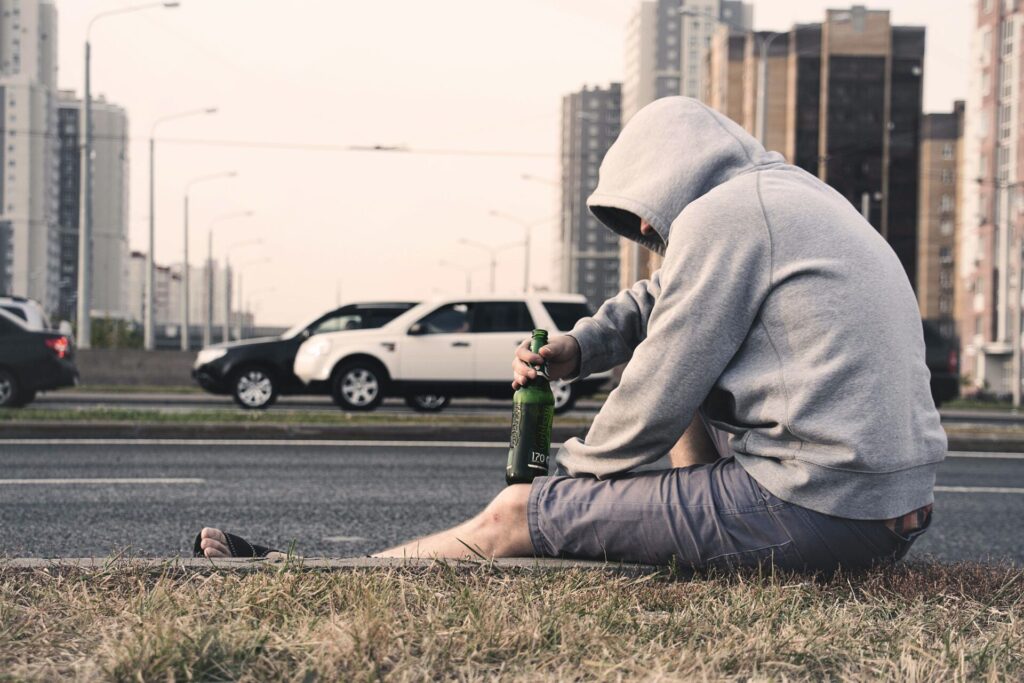
It is commonly known that substances cause bad mental health, such as anxiety or depression.
These can mimic disorders, which may cause symptoms that resemble bipolar disorder.
This hypothesis leads to these predictions:
- Substance abuse begins before bipolar disorder
- The bipolar disorder will resolve without substance abuse
As aforementioned over 60% of patients develop problems with drugs or alcohol before experiencing or being diagnosed with bipolar disorder.
It has also been found that bipolar patients with a history of alcohol abuse experience a later onset of bipolar than those without a history of alcohol.
This observation leads us to conclude that several years of alcohol abuse precipitate bipolar disorder.
If substance abuse occurs before bipolar disorder, maybe cause it, then effectively bipolar should be solved on the route to sobriety.
4. Substance misuse and bipolar disorder have common risk factors and causes
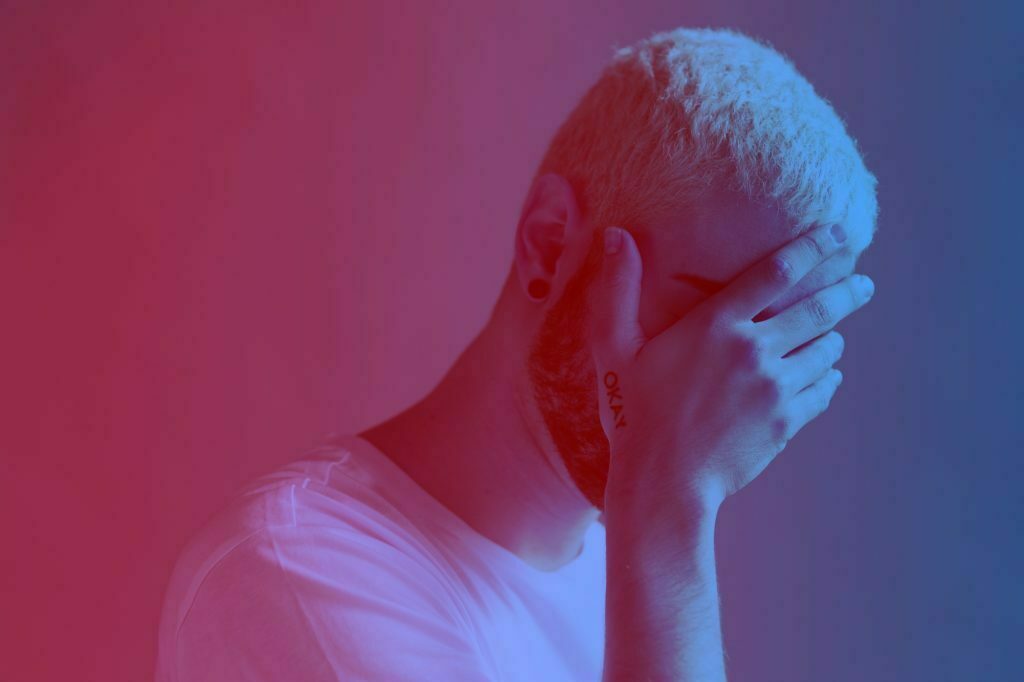
Depressed man covering his face red filter effect
For example, there might be genes that cause bipolar disorder, which may also influence the person’s chance of developing an addiction.
Bipolar disorder and substance abuse occur in around 20% of “first degree relatives” of existing bipolar patients.
It is possible that all 4 are plausible in our attempt to discover the key link between substances and bipolar disorder and other mental health issues.
Substance abuse is very common in those with bipolar disorder, occurring in over 60% of type 1 bipolar disorder patients.
Those with bipolar are 5 – 8 times more likely to end up with a SUD, where substance use is also increased after a bipolar patient is first hospitalised.
Understanding Addiction

Much addiction work over the previous decades has sought to break the stigma and marginalisation of addiction.
This was first studied in the 1930s when those with drug addictions showed less enthusiasm and a lack of willpower to carry out tasks.
This shaped the binary societal views of drugs, leading us to punish rather than rehabilitate those with drug and alcohol issues.
The Disease Model Of Addiction
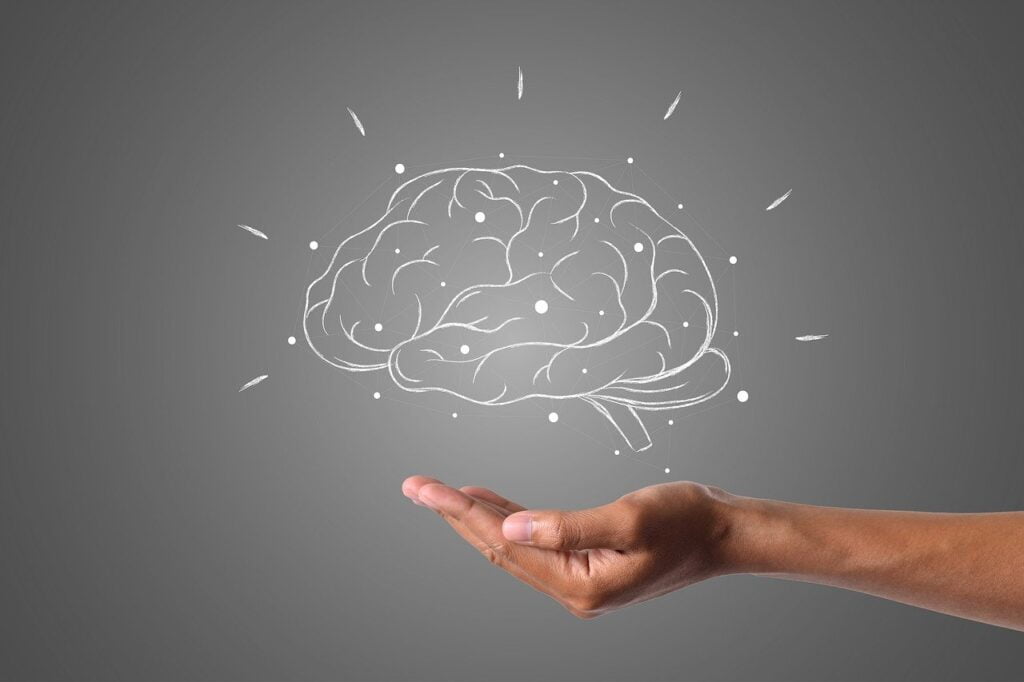
Luckily this view is shifting, with the help of the ‘disease model of addiction’.
This model proposes that addiction is parallel to disease; just as diseases have a genetic or environmental cause and require treatment, so does addiction.
Addiction is a disorder, drugs and alcohol change the reward pathways of the brain, making the abuse of substances less of a conscious decision.
Despite its critique, the disease model of addiction focuses on the loss of control users experience.
Users do not have the ability to stop, especially without the support and treatment that they so desperately need.
Relapse is also a brain disorder, standing at 40-60%, the same as those with medical diseases.
Like disease and medical conditions, addiction can be caused by someone’s genetics, development and environmental surroundings.
Gene expression increases a user’s risk of developing addiction by between 40 and 60%.
Teens and those with mental illness are at a greater risk than others.
Am I Addicted?

To know if you are addicted, a questionnaire is an easy and quick way to indicate harmful substance or alcohol use.
The CAGE questionnaire indicates this, developed into the CAGE-AID questionnaire for drug use.
If you answer a yes, that gives you 1 point. If you answer no, you receive 0 points.
A score of 2 or more indicates that you need clinical help.
- Have you ever felt you should cut down on your drinking?
- Have people annoyed you by criticizing your drinking?
- Have you ever felt bad or guilty about your drinking?
- Have you ever had a drink first thing in the morning to steady your nerves or to get rid of a hangover (eye-opener)?

The drug adapted CAGE-AID Questionnaire:
- Have you ever felt you ought to cut down on your drinking or drug use?
- Have people annoyed you by criticizing your drinking or drug use?
- Have you felt bad or guilty about your drinking or drug use?
- Have you ever had a drink or used drugs first thing in the morning to steady your nerves or to get rid of a hangover (eye-opener)?
This is scored as a yes or no, much like the initial questionnaire.
Scores of 2 or over are deemed to be clinically significant, suggesting you should ask for further medical help or intervention.
Bipolar Questionnaires

There is a bipolar test available, but this is not medically proven, so you should see a GP or seek help if you are experiencing these symptoms.
Here are a few of these questions.
- Have there been times when you felt unusual or “like a different person”?
- You couldn’t shut your mind off or stop thoughts rushing through your mind.
- You experienced feelings of anguish or desperation.
- You were much more socially active than normal, and at all hours.
- Your behaviour was unsafe or risky in a way that wasn’t normal for you.
- You felt exhausted or unusually fatigued.
- You got angry and you were aggressive or violent towards others.
- You talked a lot more or a lot faster than normal.
- You took risks with your finances which caused problems for yourself or others.
- Nothing could make you happy or joyful.
- Your sex drive was much higher than normal.
- You felt slower than normal, in your body or your mind, for a noticeable period of time.
Getting Help Today

Bipolar disorder is a very serious condition, as is addiction.
Whether you use substances to deal with the symptoms of your disorder, or if you think it may have been caused by substances, there is help available.
Our professional, non-judgemental and entirely free helpline is here to give you all the support and guidance you need.
Contact us today to take that first key step towards a happier and healthier life.


